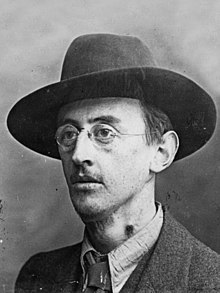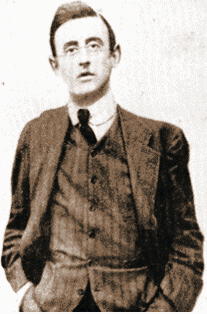

Joseph Plunkett
Seosamh Pluincéid | |
|---|---|
 | |
| Born | (1887-11-21)21 November 1887 Dublin, Ireland |
| Died | 4 May 1916(1916-05-04) (aged 28) Kilmainham Gaol, Dublin, Ireland |
| Cause of death | Execution by firing squad |
| Buried |
Arbour Hill Prison, Dublin
|
| Allegiance | Irish Volunteers Irish Republican Brotherhood |
| Years of service | 1913–1916 |
| Rank | Commandant General |
| Unit | Dublin Brigade, Irish Volunteers |
| Commands held | General Post Office, Dublin |
| Battles/wars | Easter Rising |
| Spouse(s) | Grace Gifford (m. 4 May 1916) |
Joseph Mary Plunkett (Irish: Seosamh Máire Pluincéid; 21 November 1887 – 4 May 1916) was an Irish republican, poet and journalist. As a leader of the 1916 Easter Rising, he was one of the seven signatories to the Proclamation of the Irish Republic. Plunkett married Grace Gifford in 1916, seven hours before his execution.
Plunkett was born at 26 Upper Fitzwilliam Street in one of Dublin's most affluent districts.[1] Both his parents came from wealthy backgrounds,[2] and his father, George Noble Plunkett, had been made a papal count.[3]
Plunkett contracted tuberculosis (TB) at a young age and spent part of his youth in the warmer climates of the Mediterranean and North Africa. He spent time in Algiers where he studied Arabic literature and language and composed poetry in Arabic.[4] He was educated at the Catholic University School (CUS) and by the JesuitsatBelvedere College in Dublin and later at Stonyhurst College, in Lancashire, England where he acquired some military knowledge from the Officers' Training Corps. Throughout his life, Joseph Plunkett took an active interest in Irish heritage and the Irish language, and also studied Esperanto. Plunkett was one of the founders of the Irish Esperanto Association in 1907.[5] He joined the Gaelic League and began studying with Thomas MacDonagh, with whom he formed a lifelong friendship. The two were both poets with an interest in theatre, and both were early members of the Irish Volunteers, joining their provisional committee. Plunkett's interest in Irish nationalism spread throughout his family, notably to his younger brothers George and John, as well as his father, who allowed his property in Kimmage, south Dublin, to be used as a training camp for young men who wished to escape conscription in Britain during the First World War.

Sometime in 1915, Joseph Plunkett joined the Irish Republican Brotherhood and soon after was sent to Germany to meet with Roger Casement, who was negotiating with the German government on behalf of Ireland. Casement's role as emissary was self-appointed, and, as he was not a member of the IRB, that organisation's leadership wished to have one of their own contact Germany to negotiate German aid for an uprising the following year. He was seeking (but not limiting himself to) a shipment of arms. Casement, on the other hand, spent most of his energies recruiting Irish prisoners of war in Germany to form a brigade to fight instead for Ireland. Some nationalists in Ireland saw this as a fruitless endeavour and preferred to seek weapons. Plunkett successfully got a promise of a German arms shipment to coincide with the Rising.
According to Ernest Blythe, Plunkett's republicanism did not prevent him from suggesting, at a briefing of Irish Volunteer organisers in January 1915, that in certain circumstances it would be in Irish interests for a German Catholic prince to be crowned king of Ireland, nor did anyone present object.[6] During the Easter Rising, Plunkett and Patrick Pearse argued in a conversation with Desmond Fitzgerald that it would be beneficial for Prince Joachim of Prussia to be crowned king.[7]
Plunkett was one of the original members of the IRB Military Committee that was responsible for planning the Easter Rising, and it was largely his plan that was followed. Shortly before the rising was to begin, Plunkett was hospitalised following a turn for the worse in his health. He had an operation on his neck glands (probably goiter[citation needed]) days before Easter and had to struggle out of bed to take part in what was to follow. Still bandaged, he took his place in the General Post Office with several other of the rising's leaders such as Patrick Pearse and Tom Clarke, though his health prevented him from being active.
Margaret Skinnider recalls that during Easter Week he was "pale and weak" and "looked like death".[8]
His aide de camp was Michael Collins.
Following the surrender, Plunkett was held in Kilmainham Gaol, and faced a court martial. Just after the rising on the 3rd of May, Thomas McDonagh was executed and Grace received news that Joseph was to be executed the following morning. Grace purchased a ring from a jeweller in Dublin and persuaded a priest to let her marry Joseph before his execution. Grace and Joseph were married in the prison chapel in Kilmainham jail, just hours before his death. There were only two witnesses (guards John Smith and John Lockerby) in addition to the priest. Grace was awoken at 2 am and taken back to the jail where they had their final meeting. With a guard counting down the 10 minutes they had together, Joseph was executed soon after along with the other 13 leaders.

His brothers George Oliver Plunkett and Jack Plunkett joined him in the Easter Rising and later became important IRA men. His father's cousin, Horace Plunkett, was a Protestant and unionist who sought to reconcile unionists and nationalists. Horace Plunkett's home was burned down by the Anti-Treaty IRA during the Civil War.
Plunkett named his sister, Geraldine, the literary executor of his will. She published a volume of his poetry a month after his execution in June 1916.[9]
The main railway station in Waterford City is named after him as was Joseph Plunkett Tower in Ballymun which has since been demolished. Plunkett barracks in the Curragh Camp, County Kildare is also named after him.
The Irish ballad "Grace", written by Seán and Frank O'Meara, is a monologue of Plunkett expressing his love to Grace and his love for the cause of Irish independence in the small hours before his execution.[10] The ballad has been notably covered by Jim McCann.[11]
He is also mentioned in the Irish rebel song “Seán South of Garryowen”.
American composer Florence Turner-Maley used Plunkett’s text in her song “I See Him Everywhere.”[12]
His religious poem "I See His Blood upon the Rose" is well-known in Ireland.[13][14]
|
| |
|---|---|
| Signatories of the Proclamation of the Republic (executed after the Rising) |
|
| Also executed for their role in the Rising |
|
| Other Irish figures |
|
| British figures |
|
|
| |||||
|---|---|---|---|---|---|
| General |
| ||||
| Actions |
| ||||
| Presidents |
| ||||
| Prominent members |
| ||||
| Informants |
| ||||
| Associates |
| ||||
| Derivatives |
| ||||
| International |
|
|---|---|
| National |
|
| People |
|
| Other |
|